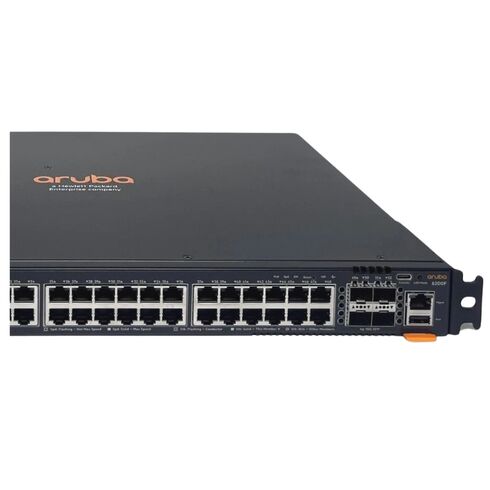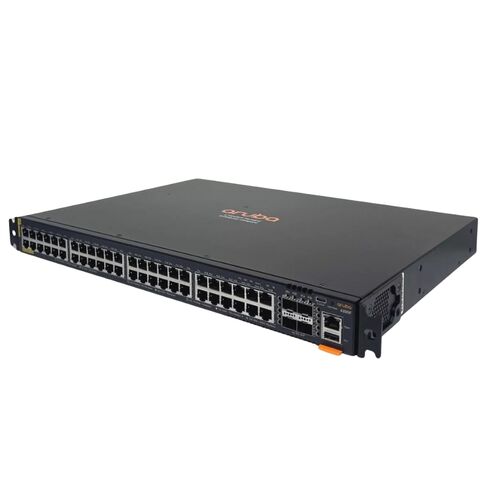JL726-61201 HPE Aruba 48-Port Managed Network Switch with 4 SFP+ Ports
- — Free Ground Shipping
- — Min. 6-month Replacement Warranty
- — Genuine/Authentic Products
- — Easy Return and Exchange
- — Different Payment Methods
- — Best Price
- — We Guarantee Price Matching
- — Tax-Exempt Facilities
- — 24/7 Live Chat, Phone Support
- — Visa, MasterCard, Discover, and Amex
- — JCB, Diners Club, UnionPay
- — PayPal, ACH/Bank Transfer (11% Off)
- — Apple Pay, Amazon Pay, Google Pay
- — Buy Now, Pay Later - Affirm, Afterpay
- — GOV/EDU/Institutions PO's Accepted
- — Invoices
- — Deliver Anywhere
- — Express Delivery in the USA and Worldwide
- — Ship to -APO -FPO
- — For USA - Free Ground Shipping
- — Worldwide - from $30
Product Overview
- The HPE JL726-61201 Aruba Networking Cx 6200f 48G 4SFP+ Switch is a robust and scalable solution designed to enhance your network's performance. This rack-mountable device features 48 gigabit Ethernet ports, advanced Layer 3 management, and supports stacking for greater flexibility. It is equipped with the latest connectivity options, security features, and an efficient design, making it ideal for high-demand networking environments.
General Information
- Brand Name: HPE
- Part Number: JL726-61201
- Product Type: mountable Network Switch
Key Features
- Device Type: Managed Layer 3 Switch with 48 Ports, Stackable
- Form Factor: Rack-mountable, Front and Side to Back, 1U Size
- Network Subtype: Gigabit Ethernet
- Ports: 48 x 10/100/1000 Ethernet + 4 x 100/1000/10G SFP+
- Packet Buffer: 8MB
- MAC Address Table: 32,768 Entries
- Jumbo Frame Support: Up to 9220 Bytes
- Maximum Stack Units: Supports up to 8 Units
Networking & Routing Protocols
- RIP-2
- IGMPv2 & IGMPv3
- OSPFv2 & OSPFv3
- MLDv2
Remote Management & Security Features
- RMON, CLI, SNMP, and MIB Support
- SSL, FIPS 140-2 Encryption Algorithms
- Authentication Methods: SSH, SSHv2, RADIUS, TACACS+
- VRRP (Virtual Router Redundancy Protocol) Support
- Trusted Platform Module (TPM)
Advanced Networking Features
- Uni-directional Link Detection (UDLD)
- Deficit Weighted Round Robin (DWRR) Scheduling
- Class of Service (CoS) and Type of Service (ToS) Support
- Rapid PVST+ and BPDU Support
- Link Layer Discovery Protocol (LLDP)
- Unsupported Transceiver Mode (UTM)
- Egress Queue Shaping (EQS)
- Address Resolution Protocol (ARP)
Hardware Specifications
- Processor: ARM Cortex-A72, 1.8 GHz
- Memory: 8GB DDR4 RAM
- Storage: 16GB Flash Memory
Connectivity Options
- 48 x 10/100/1000 Base-T RJ-45 Ports
- 4 x 100/1000/10G SFP+ Ports for Uplinks/Stacking
- 1 x USB-C Console Port
- 1 x Console RJ-45 Port
- 1 x Management Port
- 1 x USB Type A Host Port
Power Requirements
- Power Supply: Internal Power Supply
- Voltage: AC 100-120/200-240 V
Ports
The HPE Aruba JL726-61201 Managed Network Switch is equipped with an impressive 48 ports, making it an ideal choice for businesses of all sizes. These ports play a crucial role in facilitating connectivity and communication within a network, ensuring smooth and efficient operations. Let's delve deeper into the benefits and importance of this feature.
Enhanced Connectivity
With 48 ports, this managed network switch allows you to connect a large number of devices simultaneously. Whether you have multiple computers, printers, servers, or other network-enabled devices, this switch ensures that each device can be seamlessly integrated into your network infrastructure. This enhanced connectivity is especially beneficial for businesses with growing needs or those that require a high level of device interconnectivity.
Scalability
The abundance of ports in the HPE Aruba JL726-61201 makes it highly scalable. As your business expands and more devices are added to your network, you can easily accommodate them without needing to invest in additional networking equipment. This scalability not only saves you money but also simplifies network management by providing a single point of connectivity for all devices.
Flexibility
Having 48 ports grants you the flexibility to organize your network in the most efficient manner. You can allocate specific ports for different departments or functions within your organization. For example, you can dedicate separate ports for the IT department, marketing team, and finance division. This segregation allows for better control and monitoring of network traffic, optimizing performance and security.
Improved Productivity
The HPE Aruba JL726-61201 Managed Network Switch's 48 ports contribute to improved productivity in multiple ways. Firstly, by connecting all devices directly to the switch, you eliminate the need for daisy-chaining or using additional switches, which can lead to bottlenecks and decreased network speed. This direct connection ensures faster data transfer rates, resulting in seamless communication and efficient collaboration.
Furthermore, the switch's 48 ports allow for the easy integration of network-enabled devices such as printers and scanners. This means that employees can conveniently access these devices without having to connect to different networks or go through complex configurations. This simplicity saves time and reduces frustration, thus enhancing overall productivity.
Redundancy and Failover
Another significant advantage of having 48 ports is the ability to implement redundancy and failover mechanisms. Redundancy ensures that if one port fails, the network traffic can automatically be rerouted through an alternate path. By distributing traffic across multiple ports, you minimize the risk of network downtime and ensure continuous operations.
Network Segmentation
The abundance of ports also enables effective network segmentation. By dividing your network into smaller, isolated segments using virtual LANs (VLANs), you can improve security and control access to sensitive information. For example, you can create separate VLANs for guest Wi-Fi, employee devices, and servers, ensuring that each segment remains isolated from the others. This segmentation reduces the risk of unauthorized access or data breaches.
Future-Proofing
Investing in a managed network switch with 48 ports is a proactive step towards future-proofing your network infrastructure. As technology continues to advance and demands increase, having ample ports allows your business to adapt and accommodate new devices seamlessly. This scalability ensures that your investment in the HPE Aruba JL726-61201 Managed Network Switch will continue to serve your needs for years to come.
SFP+ Ports
In addition to the 48 standard ports, the HPE Aruba JL726-61201 Managed Network Switch also features 4 SFP+ (Small Form-Factor Pluggable Plus) ports. These specialized ports offer unique benefits and play a crucial role in enhancing network performance and flexibility.
High-Speed Connectivity
The 4 SFP+ ports provide high-speed connectivity options, capable of supporting data transfer rates of up to 10 gigabits per second (Gbps). This exceptional speed is beneficial for businesses that require fast and reliable communication between devices, such as data centers, multimedia streaming, or large file transfers. The SFP+ ports ensure that your network can handle demanding tasks without experiencing bottlenecks or latency issues.
Interoperability
SFP+ ports are compatible with a wide range of optical and copper transceivers, allowing you to choose the most suitable medium for your specific networking needs. Whether you need to connect using fiber-optic cables for long-distance communication or copper cables for shorter distances, the SFP+ ports offer the flexibility to customize your network infrastructure accordingly. This interoperability ensures that you can seamlessly integrate the switch into your existing network environment without requiring significant changes or additional investments.
Network Expansion
The 4 SFP+ ports provide an avenue for network expansion and future growth. As your business evolves and demands increase, these ports allow you to connect additional switches or devices that require high-speed connections. This scalability ensures that your network can effortlessly accommodate new requirements without compromising performance or stability. Whether you need to extend your network to a new office location or add more servers to support increasing workloads, the SFP+ ports offer a convenient and cost-effective solution.
Aggregation and Link Bonding
SFP+ ports also support aggregation and link bonding techniques, which further enhance network performance and reliability. By combining multiple SFP+ ports into a single logical link, you can increase bandwidth capacity and create redundancy for critical connections. This aggregation allows for load balancing and failover, ensuring that network traffic is distributed evenly and that a backup connection is available in case of port failure. These capabilities are particularly beneficial for high-traffic environments or mission-critical applications where uninterrupted connectivity is paramount.
High-Speed Storage Connectivity
The SFP+ ports can also be utilized for high-speed storage connectivity. Businesses that rely on storage area networks (SANs) or network-attached storage (NAS) systems can leverage the SFP+ ports to establish fast and reliable connections to their storage infrastructure. This enables efficient data transfers, backup operations, and real-time access to critical files, contributing to improved productivity and data availability.
Data Center Deployment
The HPE Aruba JL726-61201's SFP+ ports are particularly valuable for data center deployments. Data centers often require high-speed connections between servers, switches, and storage systems to handle large volumes of data and ensure rapid processing. The SFP+ ports enable data center administrators to create a high-performance and scalable network infrastructure that meets the demanding requirements of modern data centers. Whether it's for virtualization, cloud computing, or big data processing, the SFP+ ports provide the necessary bandwidth and flexibility.
In conclusion, the HPE Aruba JL726-61201 Managed Network Switch's 48 ports offer enhanced connectivity, scalability, flexibility, improved productivity, redundancy, and security. The 4 SFP+ ports further enhance network performance, interoperability, expansion capabilities, aggregation options, high-speed storage connectivity, and suitability for data center deployments. By leveraging these features, businesses can build robust and future-proof network infrastructures that support their growing needs while ensuring efficient operations and seamless communication between devices.













